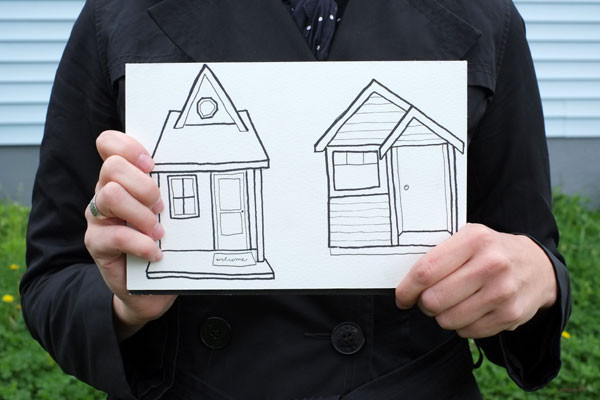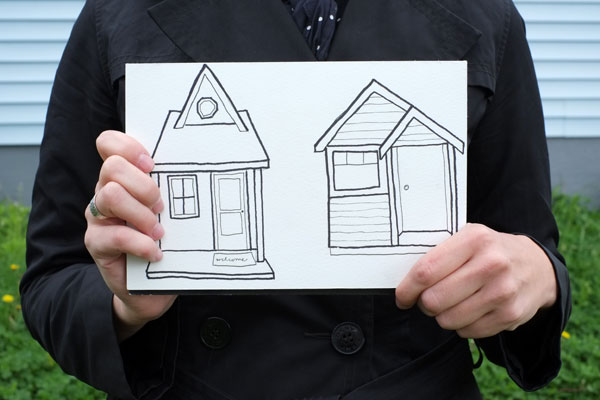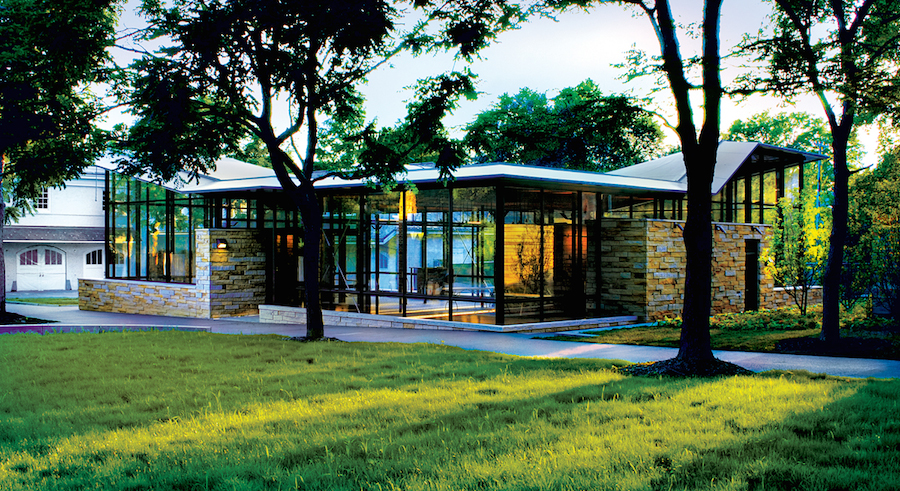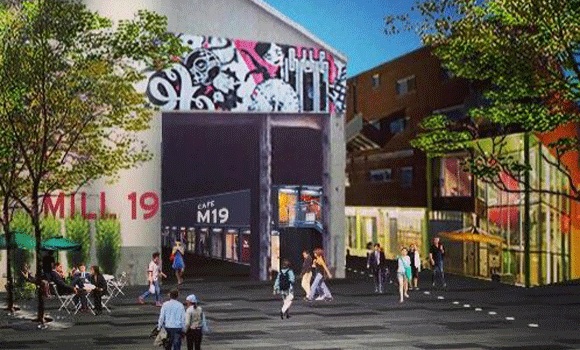From livability scores to arts accolades to technocentric nicknames like Robot City, Pittsburgh's brand is on the rise. There’s a lot happening in this town — and even more on the horizon. These 11 development projects are particularly exciting, whether you're a history buff, a visitor, a commuter, an artist or an eater.
1. Hazelwood’s billion-dollar renovation
Hazelwood, one of Pittsburgh’s most storied neighborhoods — home to historic residences and factories — is evolving again. The site of the Hazelwood Coke Works, Pittsburgh's last operating steel mill, is being renovated as part of a $1 billion project. The 178 vacant acres will become two million square feet of office, commercial and light industrial space, over a thousand housing units, and riverfront recreation space.
ALMONO Partnership, a limited partnership of local foundations with the Regional Industrial Development Corporation as its general partner, is overseeing the billion-dollar initiative. Located between Downtown and Oakland's higher-education hub, the ALMONO site in Hazelwood is the largest remaining waterfront property in Pittsburgh.![]()
2. Protected bike lanes
Mayor William Peduto announced the first phases of the city’s protected bike lane program in July. The first lanes in Schenley Park, Greenfield and Downtown were recently completed, with more lanes to follow in partnership with People for Bikes and the Green Lane Project.
The city's first protected two-way lanes run from Schenley Plaza to Anderson Playground in Schenley Park; along Saline Street between Greenfield Avenue and Swinburne Street (Panther Hollow Trail) in Greenfield; and on Penn Avenue from 11th Street to Stanwix Avenue Downtown.
These segments account for a little over a mile (out of five) that are being partially underwritten through $250,000 from the Green Lane Project, which chose Pittsburgh as one of six cities that will receive such support. The budget for this first phase, paid out of city capital funds, is $188,000.
While the locations of future lanes haven't been officially announced, Bike Pittsburgh Advocacy Director Eric Boerer noted that the first phase was planned with the spring 2015 launch of Pittsburgh Bike Share in mind. Boerer added that the brand-new protected lanes, especially on 16th and 11th Streets, have already led to smoother traffic and safer bike conditions.
3. Garfield’s first tiny house
CityLAB, a nonprofit that works on local economic development projects, has an initiative called 6% Place that explores what makes neighborhoods attractive to prospective residents. They are applying some of this research in Garfield with support from the Bloomfield-Garfield Corporation.
In May, Keystone Edge reported on cityLAB's tiny house project, an effort to combat blight and vacant lots in Garfield. Some lots are owned by the city, which creates low housing prices. If one wants to turn a vacant lot into a normal-sized house, the upside is negligible. The low appraisal prevents people from wanting to build because the end result is a low property value for a big house. But, by building smaller homes, the price is right. According to cityLAB, tiny houses could encourage buying in Garfield and change the market.
In addition to the financial incentives, people are interested in living more sustainably. Pittsburghers have expressed interest in cityLAB’s tiny houses — coming in at only 200-to-300 square feet — for various reasons. The cost of maintenance, heating and cooling is cheaper in a tiny house; retired residents are looking to downsize; and others want a home with a smaller carbon footprint.
The organization will break ground on its first tiny house at 223 North Atlantic Avenue in 2015. The home will serve as a pilot for future builders. CityLab is chronicling the tiny house’s construction in an online journal, which will then serve as a how-to manual. The house will be for sale after its completion.
4. $4 million for Smithfield Street corridor
Last month, Governor Tom Corbett announced a $4 million grant for the historic restoration of the Henry Oliver Building and the construction of a new multi-use structure at the site of a former Saks Fifth Avenue on Smithfield Street. These projects will help revitalize the Smithfield Street corridor which connects commercial districts in Downtown.
A partnership of McKnight Realty, Millcraft Investments and the Pittsburgh Urban Redevelopment Authority also announced plans to transform the Oliver Building into a 225-room Embassy Suites hotel, which will also include 250,000 square feet of office space.
The Saks site will see a six-story building boasting 30,000 square feet of street-level retail space, 100 housing units, and parking for 585 cars and 60 bicycles. The project, which includes the renovation of adjoining sites, is expected to cost more than $100 million and help revamp the corridor.
5. The Cloakroom moves into the former Shadow Lounge in East Liberty
The folks that brought you Bar Marco and The Livermore are at it again in East Liberty. The group is reviving the Shadow Lounge building (adjacent to The Livermore) as The Cloakroom, a lively bar and venue.
The Cloakroom recently opened for events and private parties; the bar will keep regular hours starting next spring. According to Joey Hilty, who does marketing and events coordination for both The Cloakroom and The Livermore, the new space will be different from the group’s other establishments; it will host concerts, dance parties and events — alongside craft cocktails.
The Cloakroom is a separate entity from The Livermore, though the two will share a kitchen. The menu — and the bar's overall style — will be influenced by East Liberty and neighborhood demand.
6. New Frick Environmental Center built in footprint of old site
The Pittsburgh Parks Conservancy and the City of Pittsburgh recently began construction on the new Frick Environmental Center at Frick Park in the footprint of the old center, which burned down in 2002.
The new center — off Beechwood Boulevard in the park’s northwest corner — will include indoor learning spaces, a reception area, public restrooms and offices, as well as an amphitheater built into the hillside, landscape restoration and gardens. Though the center is being constructed in the same framework as the old building, a second floor and basement will increase usable space.
Green initiatives are also being implemented. The new Environmental Center will meet the rigorous standards of the Living Building Challenge as well as LEED Platinum standards. The site will incorporate a geothermal heating and cooling system, fully support its own needs for water and energy, and capture rainwater for irrigation and reuse. The project is expected to be completed in two years.
7. Pens fund future in the Hill District
For decades, the Pittsburgh Penguins made hockey history in the Civic Arena, between Downtown from the Hill District. The Penguins have since moved to a new home at the Consol Energy Center, but they haven't forgotten their roots in the Lower Hill.
Last month, the Penguins agreed to pay full market value on the 28-acres where their beloved Igloo once stood. Mayor Peduto announced an agreement between Penguins management, the Hill District community and local government to transform the entire neighborhood and provide tens of millions in financing dollars for community improvements, jobs and housing.
8. Forza Group plans multiple hotels and ice rinks in Marshall Township
In June, the Regional Industrial Development Corporation sold 21.1 acres for $1.2 million to the Forza Group of Carnegie. The Marshall Township Brush Creek Road parcel will be developed into a Staybridge Suites by the InterContinental Hotels Group, which also owns Holiday Inn, Holiday Inn Express and Candlewood Suites. Forza plans to build multiple hotels and potentially more than one ice rink on the property.
9. $15 million renovation project at the Frick Art & Historical Center
The Frick Art & Historical Center in Point Breeze recently secured a $3 million Redevelopment Assistance Capital Program grant from Harrisburg. The funding will go toward building a new education and community center, the second phase of the museum's current $15 million expansion.
The project will broaden the Frick's educational outreach to children, and allow the museum to better accommodate bus tours and seniors. The project is expected to be completed by the beginning of 2016.
In July, the Frick opened a new orientation center, marking the completion of Phase I of the expansion project (launched in May 2013). The new facility serves as a focal point for arriving visitors and includes a range of interactive educational activities.
10. Boutique Hotels under development in East Liberty
Two boutique hotels are slated to open in East Liberty. The Hotel Indigo (123 North Highland Avenue) is accepting arrivals on or after January 11, 2015, according to their website. And the Ace Hotel is scheduled to open summer 2015.
The swanky renovated spaces should help position East Liberty as a hotel hub, just a hop, skip and a jump away from the city’s universities, hospitals and downtown attractions. Hotel Indigo will feature 135 rooms with plush bedding, ergonomically designed desk chairs and spa-inspired showers featuring Aveda products.
A former YMCA building (120 S. Whitfield Street) is transforming into the five-story Ace Hotel, which will boast a restaurant, ballroom and gym. According to Matt Ciccone of Edile, LLC, a co-developer of the East Liberty Ace, the Ace Hotel company only has seven hotels: Seattle, Portland, Los Angeles, New York, London, Panama City and Palm Springs. The mini-chain is headquartered in New York City and Portland. The boutique brand focus on food, drink and events.
“All the Ace hotels are designed to embrace the neighborhood that they’re in,” says Ciccone. “[East Liberty] was a perfect fit for them,” and the 1912 YMCA building is “a fantastic historic property.”
Fellow co-developers on the $24 million project include East End Development Partners and Thomas Bost of Bost Development.
11. The Paramount Film Exchange is alive and well
After years of dormancy, the Paramount Film Exchange (PFEX) is back. Built in 1926, the Paramount building in the Uptown neighborhood began its life as part of Film Row, providing an important distribution channel for iconic film studios to reach Pittsburgh’s neighborhood theaters through the 1960s.
In September 2014, the building came back to life as the second site in StartUptown’s “co-working plus” campus and the home of Denmarsh Photography. This $1.2 million renovation project was developed with both private and public funding, including $250,000 from the Redevelopment Authority of Allegheny County.
StartUptown, an entrepreneurial- and Uptown-focused nonprofit, brought half a dozen companies and 60-plus jobs to the historic site. WorkDesq, Imagine Careers, Innovesca, RenovaCare, WebKite and others utilize 6,400 square feet of space on two floors. (WebKite has operated on the entire second floor since July.)
Dale McNutt, StartUptown founder and executive director, said the PFEX campus also accommodates individual freelancers and noted that company space is nearly at capacity after just a few short months. StartUptown and Denmarsh Photography recently hosted the PFEX grand opening event on October 2.





